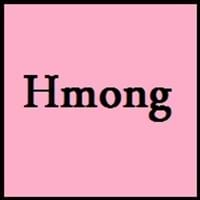Cebuano vs Hmong
Countries
Philippines
China, Laos, Thailand, United States of America, Vietnam
National Language
Philippines
China, Gambia, Laos, Thailand, United States of America, Vietnam
Second Language
Philippines
Not spoken in any of the countries, Republic of Brazil
Speaking Continents
Asia
Asia
Minority Language
Not spoken in any of the countries
Not spoken in any of the countries
Regulated By
Visayan Academy of Arts and Letters
Not Available
Interesting Facts
- About one-fifth of the population of the philippines speak cebuano and are second largest ethnolinguistic group in the country.
- Cebuano contains many words of Spanish origin.
- Hmong language may not be so popular at first sight, but it has rich history and various dialects are spoken by millions of people.
- Hmong language came from western part of China.
Similar To
Hiligaynon Language
Not Available
Derived From
Island of Cebu
Not Available
Alphabets in
Cebuano-Alphabets.jpg#200
Hmong-Alphabets.jpg#200
Writing Direction
Not Available
Left-To-Right, Horizontal
Hello
Hoy
Nyob zoo (Nyaw zhong)
Thank You
Salamat
Ua tsaug (Oua jow)
How Are You?
Kumusta man ka?
Koj nyob li cas (Gaw nyaw lee cha)
Good Night
Maayong Gabii
zoo hmo
Good Evening
Maayong Gabii
zoo yav tsaus ntuj
Good Afternoon
Maayong Hapon
zoo tav su
Good Morning
Maayong Buntag
zoo thaum sawv ntxov
Sorry
Ikasubo ko
Thov txim (Thaw zhee)
I Love You
Gihigugma ko ikaw
Kuv hlub koj
Excuse Me
Ekskyus mi
zam txim rau kuv
Dialect 1
Boholano
Hmong Njua
Where They Speak
Bohol
Laos
How Many People Speak
Not Available
Dialect 2
Southern Kana
Hmong Daw
Where They Speak
southern Leyte
China
How Many People Speak
Not Available
Dialect 3
North Kana
Hmong Do
Where They Speak
northern part of Leyte
Vietnam
How Many People Speak?
Not Available
Second Language Speakers
Not Available
Native Name
Visayan
Hmong
Alternative Names
Binisaya, Bisayan, Sebuano, Sugbuanon, Sugbuhanon, Visayan
Mong
French Name
cebuano
hmong
German Name
Cebuano
Miao-Sprachen
Pronunciation
Not Available
Not Available
Ethnicity
Cebuano people
Hmong people
Language Family
Austronesian Family
Hmong–Mien Family
Subgroup
Not Available
Not Available
Branch
Not Available
Not Available
Early Forms
No early forms
No early forms
Standard Forms
Standard Cebuano
Hmong
Language Position
Not Available
Signed Forms
Not Available
Not Available
Scope
Individual
Macrolanguage
ISO 639 1
No data Available
No data available
ISO 639 2/T
ceb
Not Available
ISO 639 2/B
ceb
Not Available
ISO 639 6
Not Available
Not Available
Glottocode
cebu1242
firs1234
Linguasphere
No data Available
No data available
Language Type
Living
Living
Language Linguistic Typology
Verb-Subject-Object
Not Available
Language Morphological Typology
Not Available
Not Available
Cebuano and Hmong Language History
Comparison of Cebuano vs Hmong language history gives us differences between origin of Cebuano and Hmong language. History of Cebuano language states that this language originated in 16th century whereas history of Hmong language states that this language originated in 19. Family of the language also forms a part of history of that language. More on language families of these languages can be found out on Cebuano and Hmong Language History.
Cebuano and Hmong Greetings
People around the world use different languages to interact with each other. Even if we cannot communicate fluently in any language, it will always be beneficial to know about some of the common greetings or phrases from that language. This is where Cebuano and Hmong greetings helps you to understand basic phrases in Cebuano and Hmong language. Cebuano word for "Hello" is Hoy or Hmong word for "Thank You" is Ua tsaug (Oua jow). Find more of such common Cebuano Greetings and Hmong Greetings. These greetings will help you to be more confident when conversing with natives that speak these languages.
Cebuano vs Hmong Difficulty
The Cebuano vs Hmong difficulty level basically depends on the number of Cebuano Alphabets and Hmong Alphabets. Also the number of vowels and consonants in the language plays an important role in deciding the difficulty level of that language. The important points to be considered when we compare Cebuano and Hmong are the origin, speaking countries, language family, different greetings, speaking population of these languages. Want to know in Cebuano and Hmong, which language is harder to learn? Time required to learn Cebuano is 3 weeks while to learn Hmong time required is 44 weeks.





